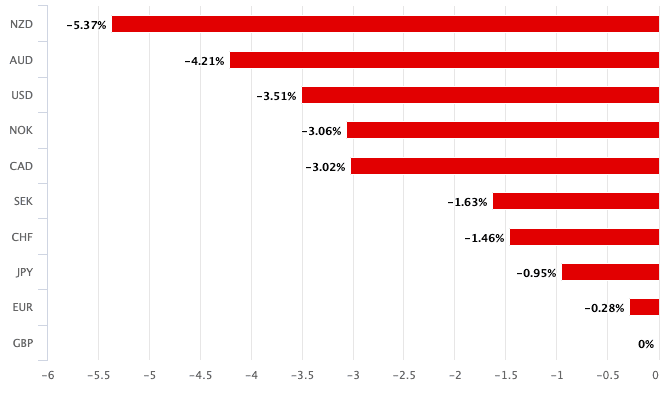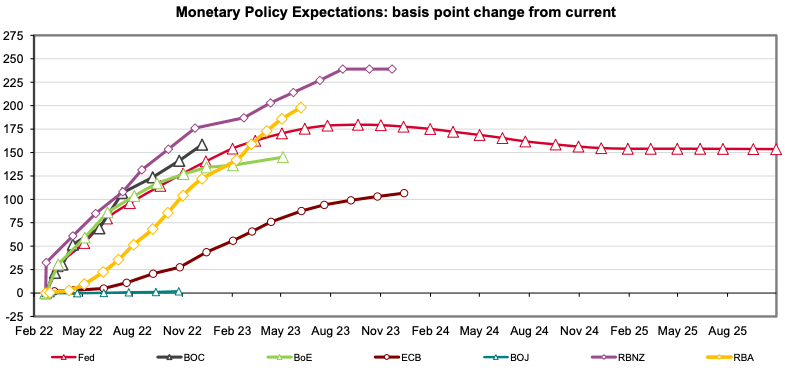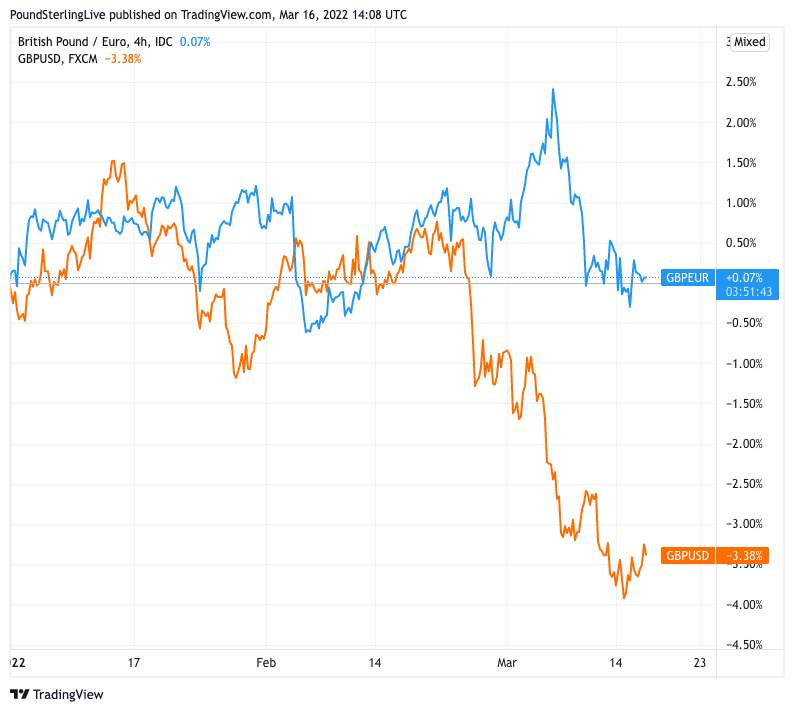Pound Sterling Looks to Bank of England for a Boost
- Written by: Gary Howes
- BoE tipped to hike rates again
- But GBP sentiment is low
- Offers scope for some relief buying
- "Rhetoric could turn hawkish" - DNB Markets

Image © Adobe Images
The British Pound enters the Bank of England's March policy decision as the worst performing G10 currency of the past month, a performance that testifies to the market's current bearishness towards the UK economy and its currency.
The Bank is expected to raise interest rates by 25 basis points, although by selling Sterling the market betrays a belief the Bank will strike a cautious tone regarding the outlook.
"Even as the BoE continues on a hiking path, we see more downside risks for GBP on the back of the ongoing geopolitical conflict, multi-decades high inflation, and a continued surge in oil prices fuelling stagflationary fears. The risk/reward is admittedly less attractive at these levels after the recent move lower, but we are not ready to call time yet," says Matthew Hornbach, Global Head of Macro Strategy at Morgan Stanley.
But sentiment towards the Pound might have now become overly pessimistic: having been the best performing G10 currency by mid-February the UK currency has now flipped to being the year's third-worst performer.
With sentiment having deteriorated so notably there is potential for some near-term relief according to some analysts.
"GBP is close to its lowest levels since November 2020, suggesting sentiment around the currency is currently quite downbeat. If we do indeed see some renewed votes for a larger hike this month, then it would likely benefit GBP in the short-term," says Dominic Bunning, Head of European FX Research, at HSBC Bank plc.

Above: GBP performance over the past month.
- Reference rates at article's last update:
GBP/EUR: 1.1934 \ GBP/USD: 1.3066 - High street bank rates (indicative): 1.1600 \ 1.2790
- Payment specialist rates (indicative): 1.1850 \ 1.3090
- Find out more about specialist rates and service, here
- Set up an exchange rate alert, here
"The Bank of England’s meeting on Thursday may offer some brief tactical upside for GBP, in our view," adds Bunning.
Ahead of the decision the Pound is seen to be struggling with the Pound to Euro exchange rate back at 1.19 having been as high as 1.2190 in early March. The Pound to Dollar exchange rate is back at 1.31 but had been as high as 1.3550 on the eve of Russia's invasion of Ukraine.
Money market pricing nevertheless shows the market is looking for 134 basis points of rate hikes to be delivered by the time the year is done as the Bank of England reacts to surging inflation levels in an economy where the unemployment rate has fallen below 4.0%.
The Bank's own regular inflation attitudes survey on March 11 revealed the public's inflation expectations for the next 12 months had jumped to the highest since 2008.
"When inflation expectations gain momentum in the surveys, it is much more difficult to guide them back down again. We therefore expect a rather hawkish, i.e. bullish for the GBP outcome of next week’s meeting," says Thomas Flury, Strategist, at UBS.
Economist Knut A. Magnussen at DNB Bank ASA is also anticipating the Bank to deliver a supportive message for Sterling.
"The rhetoric could even turn more hawkish at this meeting, as the Ukraine crisis will likely cause an additional inflationary shock," he says.
Above: The Bank of England is not anticipated to raise rates as high as some of its peers in the upcoming cycle. Image courtesy of Westpac.
Secure a retail exchange rate that is between 3-5% stronger than offered by leading banks, learn more.
But much of this inflation is derived externally and economists expect consumer and business confidence to take a knock as purchasing power is reduced.
Falling confidence and purchasing power will in turn slow economic growth over coming months.
But Magnussen says Bank Rate at 0.75% is still low by historical comparisons and well below the neutral rate. "Hence, monetary policy remains highly accommodative in an environment with high and accelerating inflation."
"We believe the central bank will have to raise rates further to curb inflation," he adds.
The ONS reported on March 15 the UK's unemployment rate fell to 3.9% while the number of job vacancies in December 2021 to February 2022 rose to a new record of 1,318,000.
"The labour market will be tighter for longer than the Bank of England expects, underpinning our view that interest rates will rise from 0.50% currently to 2.00% by end-2023," says Bethany Beckett, UK Economist at Capital Economics.
{wbamp-hide start}
{wbamp-hide end}{wbamp-show start}{wbamp-show end}
A 'tight' labour market is one that has fewer job seekers chasing a large pool of vacancies, meaning companies have to compete for talent via offering higher wages.
Since the pandemic there has also been an increase in numbers moving jobs as they seek higher wage settlements.
Higher wages in turn imply higher inflationary rates, which the Bank of England response to by raising interest rates.
But the war in Ukraine could offer another reason for the Bank of England to strike a more cautious tone than markets are expecting, which could in turn weigh on the Pound.
"Prioritising growth concerns from the Ukraine war over the inflationary shock is likely to reduce rate support for the GBP," says a weekly foreign exchange research note from Barclays.
In February the Bank's Monetary Policy Committee voted by a majority of 5-4 to increase Bank Rate by 0.25 points to 0.5%, but those four dissenting voters actually wanted a more substantive 50 basis point hike.
"Any reduction in the number of members voting for a 50bp rate hike (4 out of 9 voted for the greater rate increase in Feb) could weigh on the GBP. Prioritising growth over inflation concerns related to the Ukraine war could see GBP under pressure with rates markets paring expectations for future BoE tightening," says Barclays.
Above: Performance of GBP/EUR (blue) and GBP/USD (orange) since the start of the year.
But HSBC's Bunning says with the data pulse having remained strong in the UK in recent weeks and inflation pressures intensifying due to the surge in commodity prices since late February, there is room for a relatively hawkish outcome in terms of the MPC’s vote split.
"Should we see further calls for 50bp hikes this week by some MPC members, then we would expect GBP to bounce," says Bunning.
The war in Ukraine has nevertheless prompted the market to reduce bets for a 50 bp move in March, although the significant amount of hikes priced into the outlook still suggests a 50 basis point move is expected at an upcoming meeting.
"Markets are already pricing in four rate increases over the next three meetings, which is a tall bar for the BoE to overcome. This doesn’t leave much scope for sterling to benefit from monetary policy this week," says Marios Hadjikyriacos, Senior Investment Analyst at XM.com
Barclays say they also think the gap between market expectations and the BoE's narrative will remain wide, with the Bank highlighting risks to overreacting to short-term inflationary shocks while underestimating the medium-term downside risks to growth.
The Bank will release a statement at 12:00 GMT detailing their decision and there will be no press conference.







